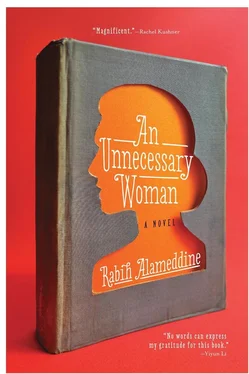She too hadn’t washed her Medusa hair or her tattered nightgown for quite a while. She probably looked as much a fright as I, but as usual, her fingernails were impeccably manicured. From two floors below, I was able to note the finely shaped scarlet nail of her forefinger pressing the trigger. From inside the apartment her husband shouted that she was insane. She blinked red eyelids at the limpid blue sky. I told her not to shoot anymore or the Israelis would bomb the building. It took her a moment to recognize me.
“That’s a big gun you have there,” she said.
Once the story of the crazy women went out, the maenads and their semiautomatic thyrsi, my half brothers stopped demanding the apartment.
Aaliya, the above, the crazy one.
I turn on the light in the reading room. Though it is barely seven thirty, the dark outside is oppressive. Winter is calling.
Ever since I retired, my dinnertime changes with the season. When I worked at the bookstore, I used to eat when I returned home, always at a fixed time. Since then, I’m not sure why, I feel hungry as soon as the sun sets and evening begins to fall. My stomach has its own circadian rhythm.
I feel tired, but it’s too early for bed.
I decide against making myself a cup of tea. Caffeine in the evening throws my system off kilter, and I can’t abide herbal infusions or the bland taste of the decaffeinated kinds. I say this as if my system were well balanced otherwise.
Of all the delicious pleasures my body has begun to refuse me, sleep is the most precious, the sacred gift I miss the most. Restful sleep left me its soot. I sleep in fragments, if at all. When I was planning for my later years, I did not expect to spend every night in my darkened bedroom, lids half open, propped up on unfluffable pillows, holding audience with my memories.
Sleep, the lord of all gods and of all men. Oh, to be the ebb and flow of that vast sea. When I was younger, I could sleep anywhere. I could spread out on a couch, sink into it, forcing it to enfold me, and disappear into the somnolent underworld. Into a luxurious ocean I plunged, into its depth I plummeted.
Virgil called sleep death’s brother, and Isocrates before him. Hypnos and Thanatos, sons of Nyx. This minimizing of death is unimaginative.
“Nothing is less worthy of a thinking man than to see death as a slumber,” wrote Pessoa. Basic to sleep is the fact that we wake up from it. Is waking then a resurrection?
On a couch, on a bed, in a chair, I slept. Lines would melt away from my face. Each quiet tick of the clock rejuvenated me. Why is it that at the age when we need the curative powers of slumber most we least have access to it? Hypnos fades as Thanatos approaches.
When I was planning for my later years, I hadn’t considered that I’d be spending sleepless nights reliving earlier years. I hadn’t thought I’d miss the bookstore as much as I do.
I wonder at times how different my life would have been had I not been hired that day.
I love Javier Marías’s work. I’ve translated two of his novels: A Heart So White and Tomorrow in the Battle Think on Me . I’ll consider a third after I read the French translation of the final volume of Your Face Tomorrow , although at more than thirteen hundred pages, I’ll probably balk at that as well.
But I digress, as usual.
In one of his essays, Marías suggests that his work deals as much with what didn’t happen as with what happened. In other words, most of us believe we are who we are because of the decisions we’ve made, because of events that shaped us, because of the choices of those around us. We rarely consider that we’re also formed by the decisions we didn’t make, by events that could have happened but didn’t, or by our lack of choices, for that matter.
More than fifty years ago, on a gloomy day when hope followed my shrimp of an ex-husband out the door, or so I thought at the time, my friend Hannah led me by the hand to a bookstore owned by one of her relatives. The relative, a second cousin once removed, had opened the bookstore as a lark, a ground-floor store with an inadequate picture window in a distressed building off a main street and no foot traffic. There were more stupid stuffed toys than there were books, and everything was covered with dust. The bookstore had as much chance of making it as I did.
Yet of all things, the flint that sparked a flame in my soul was the huge, darkly stained oak desk where the owner sat. To a practically penniless twenty-year-old divorcée, sitting behind such a desk seemed so grand, so luxurious — something to aspire to. I needed grandeur in my life.
Hannah told her relative he should hire me, and he informed her that he wanted to hire someone with more experience and, just as important, with more class. He spoke as if I weren’t there, as if I were invisible, as if his face were hidden behind a perforated printout. Hannah, my champion, wouldn’t accept defeat. She explained that I loved books and read constantly, that I knew more about them than he ever would, and, just as important, that I could dust and clean and scrub and mop. He’d have the cleanest bookstore in the city, I piped up, the most sparkling, a diamond. I would rid it of its acrid and musty odor. He pretended to mull over the offer before deciding to hire me for the time being (still talking to Hannah and not me), until he could bring in someone else to be the face of the bookstore.
What I didn’t know at the time was that the first face he offered the job to belonged to a pretty girl whose family was so classy that they immigrated to Brazil and one of their scions had recently become the governor of São Paulo. The girl left without ever showing her countenance in the bookstore. The second didn’t show up either; she married and no longer needed or wished to be employed.
Had either of these women made an appearance, my life would have been altogether different. I didn’t realize how the fate of those two had influenced mine until a few years ago when the owner mentioned it in passing. He hadn’t thought for a moment that I could do the job. He credited my success to his diligent training.
I worked for the paperback dilettante for fifty years, and mine was the only face anyone associated with my bookstore.
That huge, darkly stained oak desk I once longed for now sits comfortably in my reading room, behind it a window letting in early evening darkness, and next to it my overfilled bookcases. When the owner, my boss, died four years ago, his family closed the bookstore, sold the books and inventory for a pittance. I ended up with my desk.
How safe I will feel once I begin my translation, how sheltered, seated at this desk in the dark night, as Sebald as Jacques Austerlitz described, seated at this desk “watching the tip of my pencil in the lamplight following its shadow, as if of its own accord and with perfect fidelity. . from left to right”—right to left, in my case—“line by line, over the ruled paper.”
On this oak magnificence I place the new notepad, next to the pencils, next to the pens. I unscrew the primary pen, an old Parker, and inspect the ink. The walnut-shaped inkwell, a fake antique of porcelain and copper, is lushly full. It is always a delicious thrill when I prepare for a new project. I feel at home in my rituals.
The real antique on the desk is a comic book, an illustrated A Tale of Two Cities in Arabic, wrapped in red cellophane. Its value is sentimental only. It was woefully damaged — four pages missing, two torn, others water stained — when I received it some sixty years ago.
It was summer, I was ten. My mother took her children to the public garden of Beirut. I had only three half brothers by then, I think, the youngest still in the pram. I may not remember my siblings clearly, but I do the day and I do the dress I was wearing, my best one, a blue taffeta with white trim. It came with a white plastic handbag that wouldn’t unsnap and was, in any case, too small to hold anything but a lonesome stick of gum. I remember clutching it to my right hip at all times. I remember the sky as clear and breezy, the whitish sun lazy and indifferent, neither too warm nor too bright. My mother — hunched over, her knees touching, both feet on the ground — sat on a wooden bench that was painted an overworked brown and was missing a board in its backrest. My half brothers and I clustered around her, planets orbiting our tired star. Shoo, shoo . She wanted us away. We weren’t used to being around strangers.
Читать дальше












